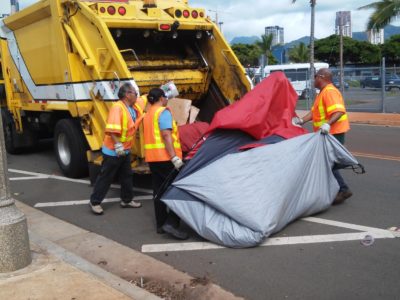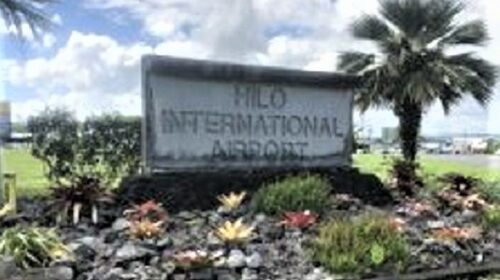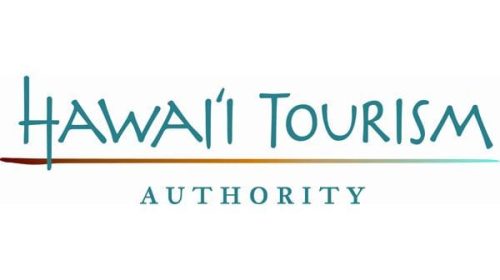ACLU of Hawaii and Civil Rights Law Firm Demand End to Houseless Sweeps
On April 30, 2020, the American Civil Liberties Union of Hawaii (the ACLU of Hawaii) and the civil rights law firm Goldstein, Borgen, Dardarian & Ho (“GBDH”) sent a letter to County of Hawaii (County) officials demanding that the County immediately put an end to houseless sweeps during the COVID-19 pandemic.
The letter focuses on the County’s April 7, 2020 sweep of people residing on a private lot adjacent to Agasa Furniture in downtown Hilo. During that sweep, two dozen County police officers and workers forcibly evicted and destroyed the personal property of 15 people, all of whom were residing on the lot with the landowners’ permission. The County provided the lot residents only 45 minutes’ oral notice before proceeding with the forcible removal using a bulldozer and several trucks.
In conducting the April 7 sweep, the County reversed course on the commitment it had made just one day earlier to local advocates, including HOPE Services and Community Alliance Partners, to move forward with a plan to relocate the residents to vacant space on the Hilo bayfront, instead of forcibly evicting them.
Brandee Menino, HOPE Services Hawaii CEO said: “Our team and community partners had been working with the men and women living in this camp, and had continued to do so during the COVID-19 pandemic, providing them with health care, education about COVID, and supplies to minimize their need to venture out into the community. They were cooperative and were working with us to develop plans to move into shelter and permanent housing. Mayor Kim’s response — to sweep without providing a safe place to relocate, shows his lack of empathy and concern for these individuals, and puts our entire community’s health and safety at risk of community spread.”
The letter describes how the County’s actions violated both state law and the U.S. and Hawaii constitutions. While the County had initiated a legal proceeding to take ownership of the lot from its owners, that proceeding had not yet resulted in a final judgment and, even if it had, state law requires the government to wait 10 days before executing on the judgment, which the County did not do. Further, the letter asserts that the County violated various provisions of the Fourth, Fourteenth, and Eighth amendments to the U.S. Constitution (and the equivalent provisions of the Hawaii Constitution) by, among other things, failing to provide adequate notice, unreasonably seizing and destroying the residents’ personal belongings, affirmatively placing the residents in greater danger of contracting COVID-19, and using the threat of arrest to unconstitutionally coerce them to leave when they had no other safe place to go to.
Wookie Kim, ACLU of Hawaii Staff Attorney said: “The County did almost everything wrong in conducting the sweep and mass eviction. It disregarded state procedures. It disregarded the Governor’s statewide moratorium on evictions. It disregarded the many protections provided by the U.S. and Hawaii constitutions. In short, the County acted as if it were above the law. We are here to ensure that the government stops taking these illegal shortcuts, especially against people who have very little power in our political system, and especially during one of the worst public health crises in modern history.”
The letter also includes a declaration from Dr. John Swartzberg, a clinical professor at UC Berkeley’s School of Public Health and a renowned infectious disease specialist. Dr. Swartzberg’s declaration explains how conducting enforcement actions against people who are houseless during the present pandemic needlessly puts people’s lives at risk and is contrary to public health.
Dr. John Swartzberg, UC Berkeley School of Public Health Clinical Professor stated in his declaration: “Conducting encampment sweeps and confiscating the belongings of people who are houseless, such as tents, sleeping materials, and food can increase the risk of adverse outcomes from COVID-19 for those who are subject to the sweep… Clearing encampments will [also] put lives at risk by increasing transmission of the virus among a vulnerable population (particularly if people are pushed to move into congregate shelters) and creating conditions that could lead to worse health outcomes for people who are subject to encampment sweeps. This, in turn, will increase the likelihood that the virus will spread throughout the wider community, further straining local hospitals and health care facilities.”
The letter asks the County to respond by May 7, 2020 with a commitment to cease “sweeps, evictions, or other enforcement actions against people who are houseless.” The letter closes by stating that “the ACLU of Hawaii and GBDH stand ready to respond appropriately, as they have done before, in defense of civil rights, and against unlawful government action.”
#rebuildingtravel




